I Saw The TV Glow
“This isn’t the Midnight Realm, Maddie, it’s just the suburbs.”
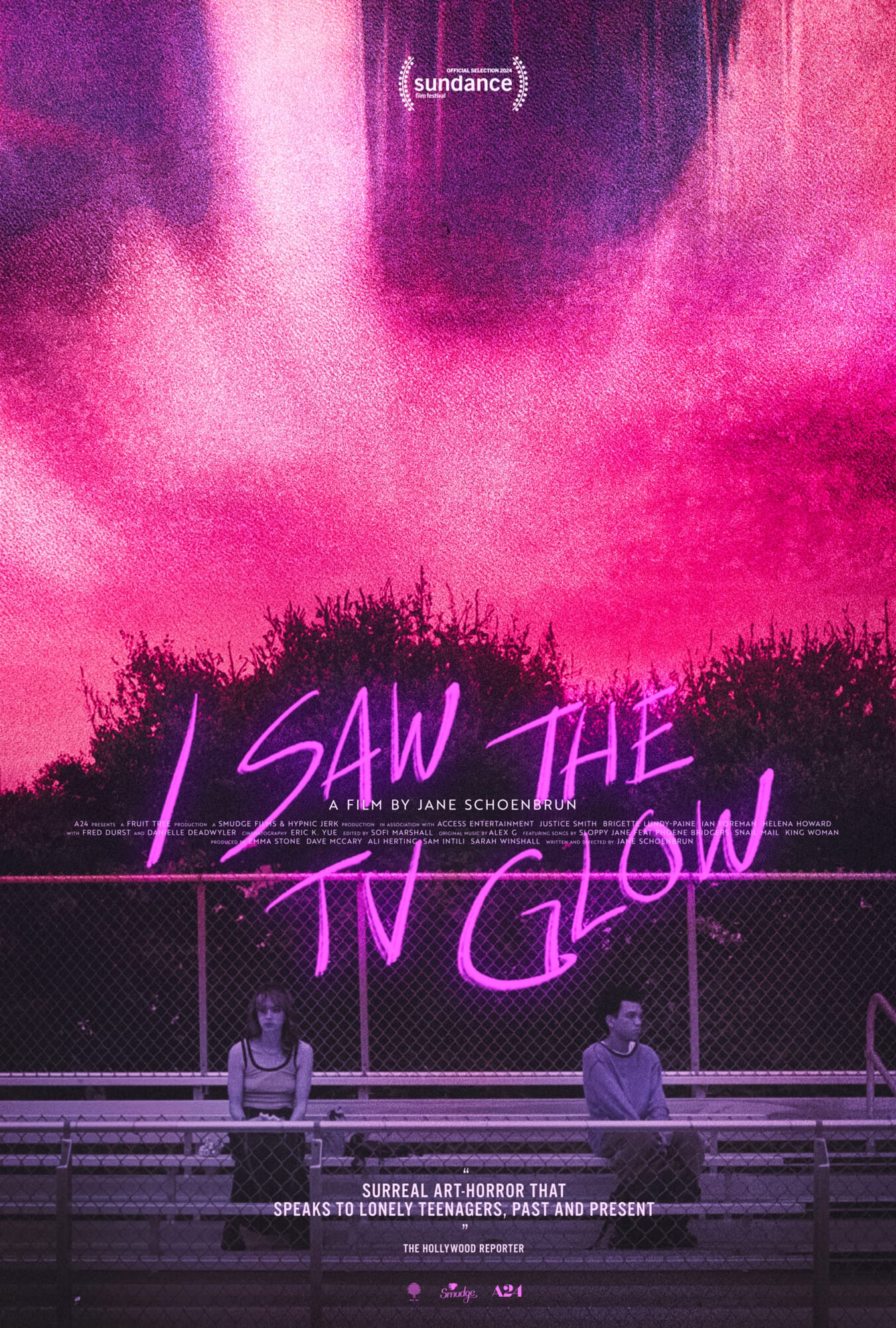
After 15 year old Maddie introduces 13 year old Owen to a mysterious late-night TV show about a supernatural world that exists outside their own, Owen's reality begins to fracture and crack.
Jane Schoenbrun’s first film, We're All Going To The World's Fair, has been in my streaming queues forever. I’ve meant to check it out for a long time now, but just… haven’t yet. After seeing I Saw The TV Glow, I plan on bumping it up in line.
Most people aren't as behind as me when it comes to seeing some films, and because of We’re All Going To The World’s Fair, there was a lot of buzz for I Saw The TV Glow, which is Schoenbrun’s second film. So, I've been hearing the hype for a while now, and I’ve been looking forward to it. There just aren’t that many trans filmmakers out there who have this much creative control of their projects, especially on a scale like this, so I was very interested in seeing something from a new voice/perspective. They’re certainly not the first trans filmmaker out there whose identity has impacted their story, of course, but they might be one of the first to then craft a very personal metaphorical narrative out of it, as here, the sense of unreality in I Saw The TV Glow is used to explore the experiences of a person first beginning to figure out that they are trans.
So, for that much at least, it’s laudable.
Whether or not it all works in the end… well, that’s a bit more of a question.
I Saw The TV Glow begins in 1996, set in some ubiquitous slice of suburban malaise and mediocrity, and centering on a pair of lonely teens who bond over a Buffy-like TV show called The Pink Opaque. The show is about two telepathically linked teen girls, who met once at summer camp and since then have lived miles apart from one another, but who still fight villains of the week together, as their separate stories twine together. These monsters are sent by the show’s Big Bad, a creature lurking in the sky, looking like Georges Méliès‘ moon from the 1902 sci-if film A Trip To The Moon, an evil monster named Mr. Melancholy.
Owen’s mom is gentle and loving and dying of cancer. His dad is cold, curt, and distant. They want Owen in bed by 10pm, as he’s only 13, so he lies about going to a sleepover at a male classmate’s house on Fridays, so that he can go to 15 year old Maddie’s house to watch the show, then secretly sleep in her basement. Maddie is older and cool, and presents as tough, but the never-seen upper levels of her house sound tumultuous, and she is clearly scared of the loud murmur of her stepfather’s voice that they can hear rumbling down through the basement ceiling. But for half an hour each week, The Pink Opaque is an escape for both of them, providing a window into a restless angst they both feel, but can’t really put a name to.
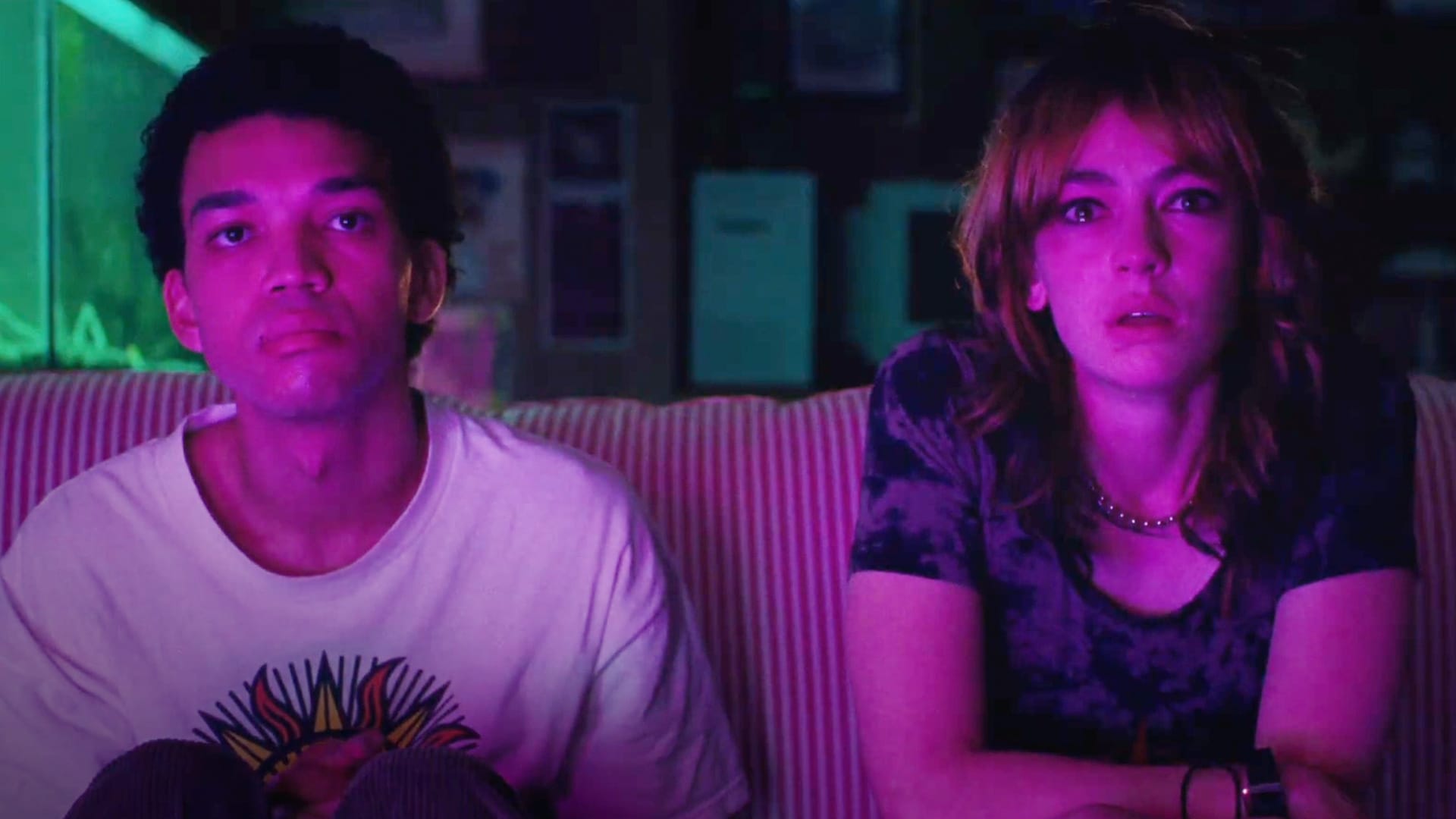
Owen is fascinated by the show from the first moment he sees it, but the fake sleepover is not a ruse they can do often, so Maddie leaves him VHS recordings of random episodes in their school darkroom. The titles of each episode are written in sparkling pink ink on each tape, like “Homecoming to Get You” and “The Trouble with Tara Part 1.” Owen devours each one of these videos, ingesting every single moment. They’re everything to him.
He has to hide this love though, as his dad thinks The Pink Opaque is a show for girls, and his days are otherwise spent in a high school obsessed with aggressive masculinity. Owen walks the tight confines of the brick hallways with his shoulders hunched, trying not to be seen, threading through the crowds, the walls covered in sports related motivational declarations like “Pain is weakness leaving the body” and “Winners Never Quit” and “No pain, no gain.”
It’s only when he turns down the long hallway that leads to the darkroom, where a new tape waits, the sun-bright windows on both sides painted in the very obvious symbolism of light blues and pinks, that Owen seems to loosen up.
Maddie and Owen are both outsiders, and their friendship is of course very intense, maybe too intense, as both are a bundle of raw emotions, live wires, and awkward insecurities. When Maddie has finally had enough of life in this suburban world, and decides that they both need to run away together, Owen chickens out, ratting himself out about the secret sleepovers, as he is unable to say no to Maddie, but he is just as unwilling to leave his mom, who is lingering, slowly dying in the cancer ward.
But after that, Maddie disappears, and The Pink Opaque gets cancelled.
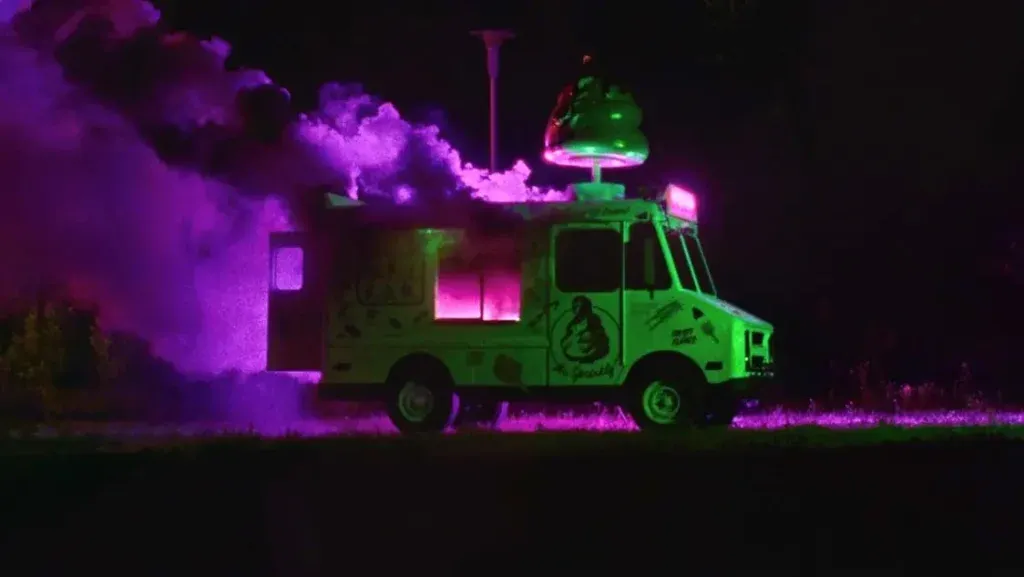
The rest of the film leapfrogs through the years.
In 2006, Owen works in a movie theatre, drifting though life. But then Maddie is suddenly back, and she’s different. She tries to convince Owen that this world isn’t real, that the world of The Pink Opaque is real, and that in reality, they are the two main characters, and Mr. Melancholy has trapped them here, a place known as The Midnight Realm. Maddie says that time moves differently here, that years here are just seconds there, and that in the world of The Pink Opaque, they’re dying, so they have to hurry back, before it’s too late. But when she tries to take Owen back with her, he refuses, he just can’t make the leap.
Then it’s 2010, and Owen’s life is slipping away from him into a sedated suburban doldrums. He’s got a family of his own, and is a productive member of society with a huge TV. One night, he streams the Pink Opaque, and discovers that the show is nothing like he remembers, that it's a silly and obvious kids' show, that the spark that he once saw there is gone. Maybe he just misremembered it?
Then it’s 2018, and Owen is getting older, and visibly sicker. He works in a family fun center, a place of contestant strobes, day-glow paint, and a cacophony of bells and whistles and screaming children, and it’s getting to him, he’s fraying. Finally, Owen can’t take it any longer and he loses his shit, screaming in the middle of a child’s birthday party that he is dying, that he can’t breathe, as he melts down in the corner. In the bathroom, after all these long years, Owen finally confronts the thing that lives inside him. He confronts it, but then stumbles away from it again, wheezing apologies for his outburst—for his entire existence—to the indifferent patrons and fellow employees.
And that’s it. Roll credits.
So, for the most part, especially when it comes to the film’s central metaphor, Schoenbrun really excels at communicating their experiences through the language of cinema, instead of saying it outright. It’s very well done. It's clear that Owen’s world is wrong somehow, and that he is denying something fundamental about himself. The reality of Owen's "real world" is especially clear when filtered through the playful CW-ness of episodes of The Pink Opaque. Through the silliness of the show, we not only see some truths about Owen and Maddie laid bare, but also how their mundane reality—the confines of conventional suburban life they’re trapped in—is suffocating them, and even worse, that perhaps this truly is on purpose, that their world is deliberately trying to crush them.
This is the existential horror at the heart of the film, this terrifying feeling of the loss of self to a smothering prison of comfort and conformity, of being restrained by the paralyzing fear of what might happens if you try to break free.
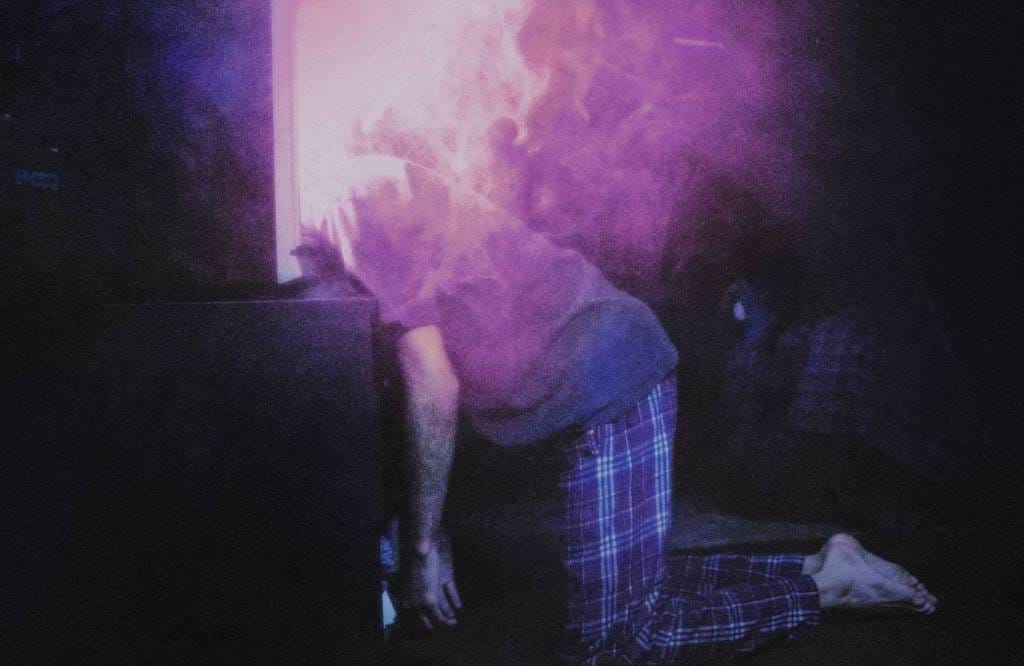
It almost works.
The general problem for me is that Owen is way too passive. I can’t tell if he is unwilling to take action, or just incapable of it. I think it‘s fair to say that he is so inactive, he doesn’t have a character arc. Even his climatic outburst—while a truly fantastic moment—still only seems to result in him resetting once again to his zero point. Is there something going on here with regards to a denial of himself due to a fear of embracing the fact that he is transgender? I’m not sure. Maybe. Either way, it makes for a frustrating viewing experience, because the whole time, you’re just waiting for Owen to take action, to make a different choice, to take some kind of chance, to do anything really, but the whole film is basically just him repeatedly rejecting of the call. That just felt… disappointing. Unfulfilling.
Plus, at one point, maybe the film’s worst moment, Maddie delivers this long monologue which very clearly, and at great length, lays out the whole trick. The scene is just Maddie basically walking in a slow circle and telling us about all the shit that’s really happening, and how The Pink Opaque ties into their lives, and blah, blah, blah. The actress playing Maddie does a good job with what was no doubt quite a few really dense paragraphs of text in the script…
But…
As clever as the world of the fictional show is, especially couched within the film’s central metaphor, this monologue, obviously, is all show, no tell. And nothing kills momentum more than that. Plus, by the time the film is all done, it just feels like a missed opportunity not to use the world of the show more directly. I’m not looking for an adventure story or anything here, but I do feel like it needed more of a direct connection with all of the pieces that this puzzle lays out throughout the film, and it just doesn't do that. In the end, all these connections are left unmade, and Owen just stumbles away.
As a result, for me at least, I Saw The TV Glow occupies a strange place where it’s both very good, especially when it comes to depicting the relationship that people have to the art they latched onto early in life, those things that helped them realize who they really are, and yet, it also feels incomplete. Like I said, walking away, it’s mostly a frustrating watch, because the film doesn’t seem to do much with it’s central metaphor other than to just point out its existence. That Schoenbrun lays bare their own experiences so clearly, and does such a good job with it, is really impressive, sorely needed even in our current world, but it’s hard not to feel like maybe this message would have been better served within a story that ultimately wasn't so half-baked.
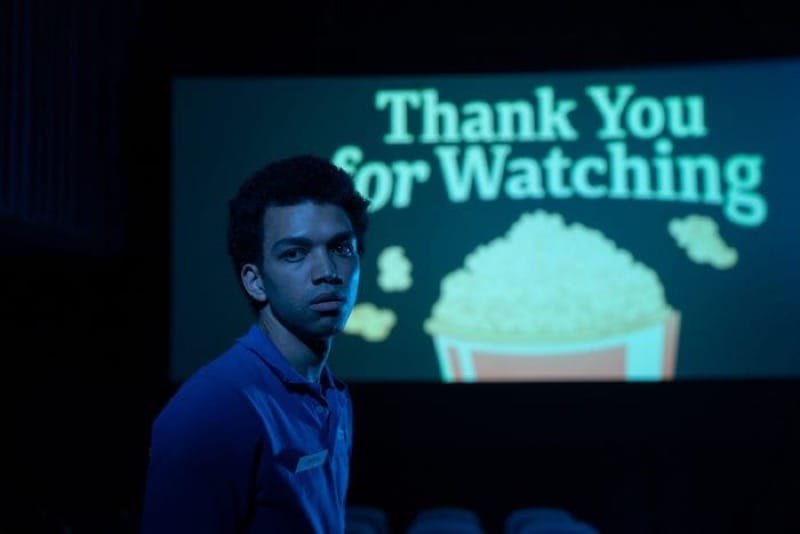
Quick tangent: It was great to see Amber Benson show up in the film, I loved that. But also, as great as that was, as appropriate as it felt for this particular film, it felt equally as random that Fred Durst was in the film too. Fred Durst? All right, that's cool, I guess.
Anyway, I Saw The TV Glow is definitely worth watching. It’s one of the more interesting films out there right now. Plus, in general, it’s a good movie. I’ll be looking for more from Schoenbrun in the future. But for me, the thing that holds the film back is that it ultimately feels like it’s more concerned with its metaphor than it is with its story. Now, understandably, this might not matter as much to some, and that’s cool, I get it. This film was, after all, obviously done through a queer lens, and also speaks directly about the trans experience, and there aren’t many things like that out there, so your own personal mileage may vary.
But for me at least, it doesn’t completely work.
